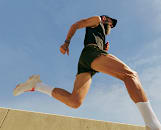
Olga Rolenko / Moment via Getty Images
Do Electrolytes Give You Energy? It’s a Little Complicated—Here's What to Know
Feeling tired after sweating up a storm during your workout? Find out how electrolytes might be involved in the energy equation.
By Karla Walsh•
Picture an athlete getting pumped up right before a workout or game. You might imagine them doing some dynamic stretches, listening to motivational music, or chugging an electrolyte drink to feel energized and ready to go. But hold on—do electrolytes themselves actually give you more energy?
Discover more ways to reach your goals with Peloton
Before we dive into what electrolytes can and can’t do, let's back up a bit. “Electrolytes are minerals in the body that carry an electric charge when mixed in water—which makes up most of your body,” explains Jena Brown, RD, a sports dietitian and the owner of Victorem Performance Nutrition. “In water, they conduct or ‘bounce’ electrical charges between each other.”
Electrolytes, such as sodium, potassium, calcium, and magnesium, are essential minerals that make many cellular reactions possible, Brown says. Everything from nerve regulation and muscle contraction to fluid balance and our body’s pH levels are affected by electrolytes, adds registered dietitian nutritionist Frances Largeman-Roth, RDN.
Clearly, electrolytes deliver key benefits—but do electrolytes give you energy?
Do Electrolytes Give You Energy?
No, electrolytes do not give you energy, confirms Kelly Jones, RD, a board-certified sports dietitian: “True energy is provided by calories and comes from the three macronutrients—carbohydrate, fat, protein—as well as alcohol.” However, although electrolytes don’t deliver energy themselves, they do play an essential role in the process.
When we consume foods and drinks with calories, our bodies require water and the presence of certain electrolytes to “unlock” the energy and convert carbohydrates, protein, fat, or alcohol into usable energy. The addition of water at some steps allows bonds from food molecules to break apart and release energy, Jones explains. This energy is then stored as one of our body’s ideal forms of fuel, adenosine triphosphate (ATP), Brown adds.

Peloton App
Access thousands of classes with no equipment needed.
How Electrolytes Support Energy
Besides acting like a key to help us capture, store, and eventually use the energy we eat, electrolytes also impact several other energy-related systems within the body.
Electrolytes Support Hydration and Cellular Fluid Balance
Research suggests that when we’re dehydrated, we can feel sluggish (a feeling many of us can attest to). While electrolytes alone won’t rehydrate us, they work together with water and carbohydrates to hydrate us at a rapid pace, Largeman-Roth says. (Since this is the case, she advises clients to reach for electrolyte-rich foods or electrolyte mixes that contain some carbs in the form of sugar or coconut water.)
Electrolytes help maintain fluid balance inside and outside of cells, Brown continues. Adequate hydration is essential for blood flow and energy production, which helps regulate energy levels and reduce fatigue, she says. When you’re well-hydrated, your blood can deliver oxygen and nutrients more effectively.
“When both fluid intake and electrolyte intake are adequate to support good hydration status, fluid can play its role in energy metabolism more efficiently and help regulate energy levels,” Jones explains.
They’re Found In Foods and Drinks That Offer Energy and Nutrition
The most direct way that electrolytes can influence energy levels? They’re almost always found in foods and drinks that provide our bodies with energy-giving calories via carbs, fat, and/or protein, Brown says.
“Electrolyte supplements are popular these days, but they should not replace electrolyte-rich whole foods in the diet,” Brown says. “Whole foods provide other nutrients and health benefits, such as fiber for gut health and amino acids for muscle recovery, both of which are essential for maintaining energy levels and overall wellbeing.”
Some of the best food sources of electrolytes include baked potatoes, bananas, cottage cheese, pickles, lentils, Greek yogurt, and salmon, but there’s no shortage of options.
Electrolytes Help Regulate Blood Pressure
A fluid imbalance within the body can cause blood pressure to spike or crash. Either of these scenarios “can trigger muscle weakness or lethargy,” Jones says.
It’s a delicate balance: If sodium intake is high and potassium intake is low, you may retain too much fluid, leading to high blood pressure and muscle weakness in some individuals, Jones explains. On the flip side, if sodium isn’t replenished—especially among those with high activity levels and sodium sweat rates—the sapped sensations may be related to low blood pressure.
“Replenishing sodium lost through sweat and consuming adequate amounts of potassium allows for healthy regulation of blood pressure,” Jones says, which indirectly supports balanced energy levels.
They Allow for Strong Muscle Contractions
Sodium and potassium also affect nerve impulses and muscle contractions, Jones explains, with calcium playing a pivotal role too. So if your body has too many or too few of these electrolytes, it can impact energy levels, since an electrolyte imbalance can create a chain reaction and cause unwelcome sensations like muscle weakness, cramping, and fatigue, Brown tells us.
If you’re falling short on any of these key minerals, replenishing those missing electrolytes “can feel like putting gas in a car,” Largeman-Roth says. “You’ll likely feel like your muscles are working for you again—and you have the energy to use them.”
They Can Reduce the Risk of Energy-Zapping Headaches
Headaches are another possible ripple effect of dehydration, Largeman-Roth says. While headaches don’t inherently always lead to lethargic feelings, they certainly don’t make us feel great—or feel ready to conquer the day or a workout.
“It’s possible that someone who has a headache from being mildly dehydrated with low electrolytes could feel more energetic after rehydrating with a food or drink with electrolytes,” Largeman-Roth says.
The Takeaway
By themselves, electrolytes do not directly provide energy. But they are a crucial part of our body’s larger energy-making process. Plus, electrolytes make it possible for our bodies to work efficiently, maintain adequate hydration levels, and steer clear of some vigor-reducing ailments, such as headaches, further supporting our energy levels indirectly.
Related Articles

Nutrition
Does Protein Give You Energy? Dietitians Break It Down

Nutrition
Electrolytes Are About More Than Just Hydration. Here Are 5 Key Benefits to Know

Nutrition
21 Foods with Electrolytes to Support Hydration, Muscle Function, and So Much More

Health
This Is How Regular Exercise Gives You an Energy Boost
This content is for informational and educational purposes only and does not constitute individualized advice. It is not intended to replace professional medical evaluation, diagnosis, or treatment. Seek the advice of your physician for questions you may have regarding your health or a medical condition. If you are having a medical emergency, call your physician or 911 immediately.
Level up your inbox.
Subscribe for a weekly dose of fitness, plus the latest promos, launches, and events.
By providing your email address, you agree to receive marketing communications from Peloton.
For more about how we use your information, see our Privacy Policy.





